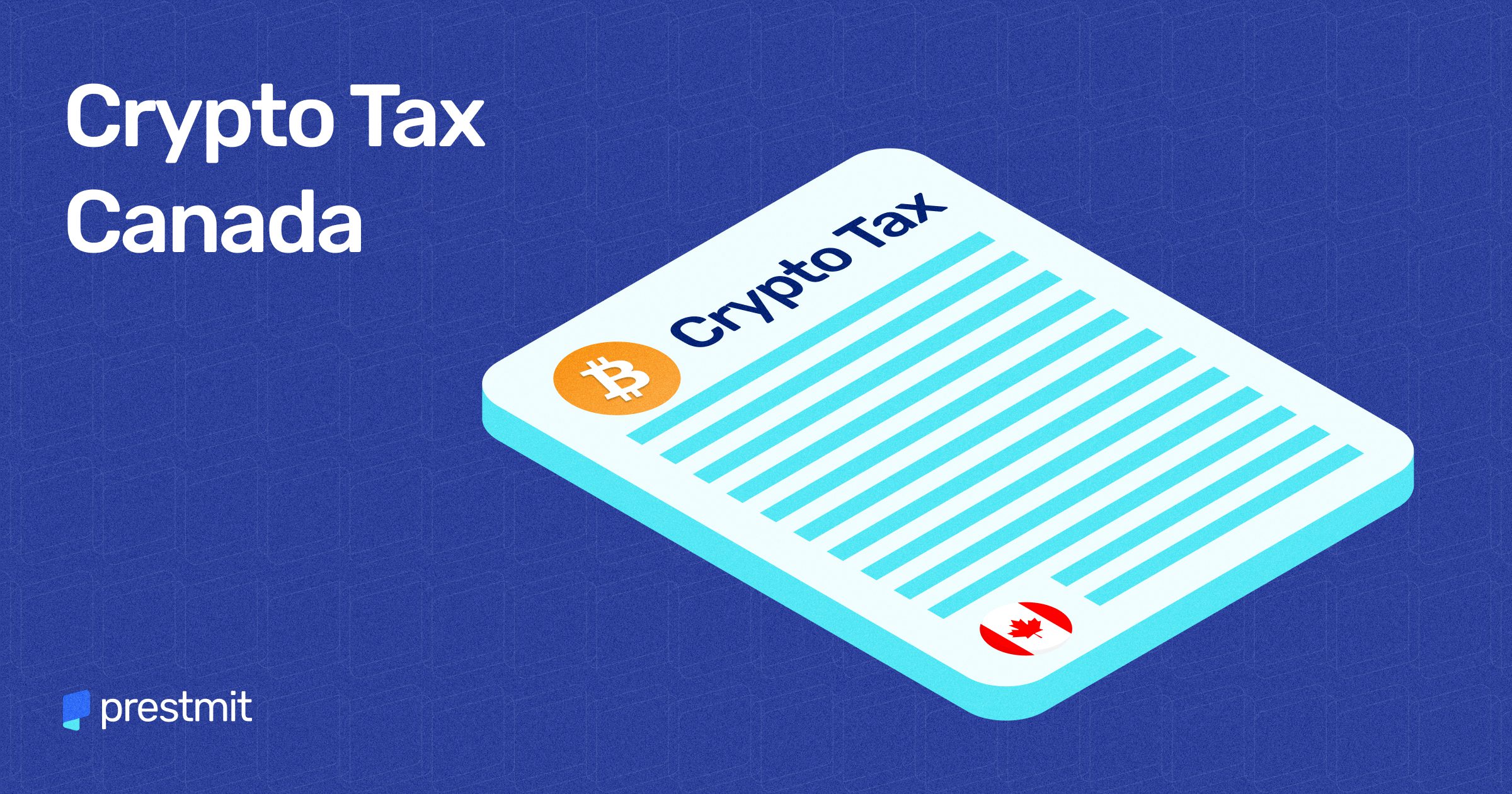Table of Contents
Bitcoin and other cryptocurrencies have revolutionized our way of thinking about money, as they are increasingly becoming the future of money in this digital age. As these digital assets are gaining popularity, Canada embraces them with open arms but with tax obligations for crypto holders. Therefore, this article will guide you in understanding the intricacies of Crypto tax in Canada.
An Overview Of Crypto Tax In Canada

Crypto tax in Canada is under the purview of the Canada Revenue Agency (CRA), which classifies Bitcoin and other crypto assets as commodities. This means that every crypto transaction is treated as a commodity similar to gold or silver.
This classification has significant taxation implications. Gains from crypto transactions are subject to taxation as capital gains or business income.
Capital gains occur when individuals dispose of crypto assets through selling, trading, or using them to make purchases. This tax applies to 50% of the total capital gains for individual crypto holders. But, the gains of users engaging in crypto day trading are subject to 100% taxation as business income.
Tax Rates For Crypto Tax In Canada
Crypto capital gains are taxed in Canada at the same rate as Federal and Provincial Income Taxes. So, crypto-assets do not have separate short—or long-term capital gain tax rates. However, the rates conform to individuals’ income levels.
Here are the Federal Income Tax bands:
- 15% income tax on your first C$53,359 taxable income.
- 20.50% income tax for income from C$53,359 – C$106,717.
- 26% income tax for income from C$106,717 – C$165,430.
- 29% income tax for income from C$165,430 – C$235,675.
- 33% income tax for income of C$235,675 and above.
Meanwhile, it should be noted that these rates apply to both capital gains and income from crypto transactions.
How To Calculate Capital Gains For Crypto Tax In Canada
Here is a breakdown of calculating capital gains for your taxation:
- Tax Rate: 50% of your capital gains are taxed at your marginal income tax rate, which combines your federal and provincial income tax rates.
- Cost Basis: This is the original cost of your crypto asset, including the transaction fees you paid for the purchase. The cost basis is used to determine your capital gain or loss.
- Adjusted Cost Basis (ACB): The CRA employs a method of calculating the ACB, which depends on any subsequent acquisitions or dispositions of the same crypto asset.
- Taxable Events: Any event resulting in a capital gain or loss. This includes selling, trading, donating, or using cryptocurrency to pay for products and services.
Let’s look at an example of paying crypto tax in Canada:
If you bought 1 BTC for C$5,000 in 2023 and sold the coin for C$10,000. This is how you will calculate your capital gain and income tax:
Capital Gain: C$10,000 (selling price) – C$5,000 (cost basis) = C$5,000 capital gain.
Taxable Capital Gain: C$5,000 x 50% = C$2,500.
Income Tax: C$2,500 x your marginal income tax rate (e.g., 20.6%) = C$515 income tax.
What You Need To File Crypto Tax In Canada
While the CRA emphasizes the need to have proper record-keeping to report your crypto holdings accurately, these are some key recommendations:
- Type of Transaction: A purchase, sale, exchange, or disposition.
- Date of Transaction: The date that the transaction occurred.
- Description of Cryptocurrency: The name of the cryptocurrency involved.
- Amount of Cryptocurrency: The amount of cryptocurrency involved in the transaction.
- Cost Basis: The cost of acquiring the cryptocurrency, including transaction fees.
- Proceeds Received: The amount received from the transaction, including any fiat currency or other cryptocurrencies.
- Wallet Addresses: The wallet addresses used for the transaction.
- Exchange Platform: The name of the exchange platform used (if applicable).
- Fair Market Value: The cryptocurrency’s fair market value at the time of the transaction.
Deadline For Reporting Crypto Taxes
The Canadian tax cycle runs from January 1 to December 31. Any income earned or losses incurred during this period must be reported to the CRA on your income tax return.
The deadline for filing your income tax return and reporting your crypto taxes to the CRA is April 30, following the end of the tax year. However, the deadline may differ if you are self-employed or have a business.
Tax-Free Crypto Transactions In Canada
There are some crypto transactions that are deemed tax-free as they give investors a sigh of relief in navigating the complex landscape of crypto tax in Canada. A knowledge of these exemptions is imperative for individuals seeking to optimize their financial strategies.
1. Holding Cryptocurrency
Holding crypto assets in a wallet or an exchange enables you to avoid crypto taxes. However, you must report any holdings on your tax return when you dispose of them via a taxable transaction.
2. Transferring Between Wallets
The CRA does not consider transfers from one wallet to the other a taxable event. This is because the assets are moving without making gains or losses.
3. Buying Cryptos With Fiat Currency
Crypto purchases using fiat currencies like the Canadian or US dollar are not taxable. The cost basis of the acquired crypto asset will be the amount of fiat currency you used to buy the coin. However, the cost basis is relevant when you later dispose of the cryptocurrency and determine your capital gain or loss for tax purposes.
4. Borrowing Cryptocurrency
Borrowing cryptocurrency does not incur any immediate taxable action. But, any interest earned on the borrowed crypto asset is taxable and must be reported on your tax return.
In addition, if you use the borrowed cryptocurrency to generate income through lending or staking, those earnings may also be subject to tax.
How To Minimize Crypto Taxes In Canada
1. Tax-Free Savings Account
Direct holding of crypto assets is prohibited in tax-free savings accounts (TSFA). However, experienced investors use this tax-advantaged account by investing in Exchange-traded funds (ETFs) that track crypto prices. This provides a tax-efficient way to understand the market within the TSFA framework.
2. Include Transaction Fees In Adjusted Cost Basis
Transaction fees from crypto transfer and trading can be added to the adjusted cost basis. This enables investors to effectively reduce their overall capital gains. Ensure that you keep records of these fees for accurate reporting.
3. Utilizing Cryptocurrency Losses
Capital losses can be a great tool for offsetting capital gains and reducing overall tax liability. Investors can sell depreciated cryptocurrencies to offset gains earned in other transactions.
However, it is important to adhere to the Superficial Loss Rule, which restricts claiming a loss if the same crypto asset is repurchased within 30 days.
Frequently Asked Questions (FAQs) About Crypto Tax In Canada
What Is The Tax Rate On Crypto Rates In Canada?
Only 50% of your capital gains from crypto are taxable, as the tax rate depends on your tax bracket. Any income earned from crypto activities like staking or mining rewards is subject to income tax at your marginal rate.
Do I Need To Report Crypto Income On My Tax Return?
You must report all your crypto income on your tax return in Canada. This includes income from capital gains, business income, etc. Failure to report crypto income could attract penalties and interest charges.
What Happens If I Sell Crypto At A Loss?
If you sell crypto at a loss, you can claim a capital loss on your tax return. This will help reduce your taxable income for the tax year. Capital losses can also be carried forward to offset future capital gains.
Conclusion
While crypto tax in Canada can seem a bit complex, understanding your tax obligation is essential to avoid penalties and ensure financial compliance. Whether you are a beginner or an experienced investor, this article will guide you through the crypto landscape in Canada without issues.
Last updated on August 8, 2025

